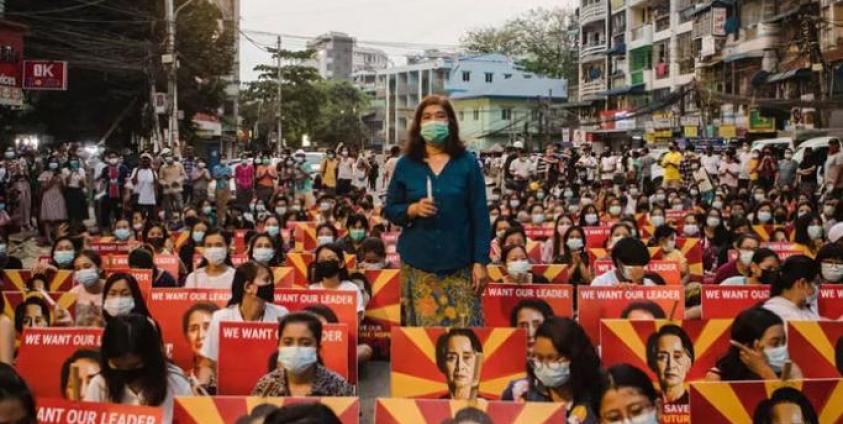Myanmar citizens have been hit by the negative effects of the 1 February 2021 military coup in different ways. But if there is one segment of the population that has really suffered, it is the women.
With soldiers, police and sandbagged bunkers on the streets and heightened tension in major cities, women are scared to leave their homes and the peace, political and economic rights they enjoyed for a decade are rapidly disappearing.
This is the finding of a recent UNDP report entitled, “Regressing Gender Equality in Myanmar: Women Living Under The Pandemic And Military Rule” released in March.
Rising violence and insecurity are forcing women in Myanmar to stay away from jobs and healthcare services, says the UN survey of over 2,200 women, which signals a deterioration of the development gains seen in the country over the last decade.
The survey found that one-third of women are afraid of walking in their neighbourhoods, even during the day.
This is a sharp departure from what women in Myanmar said in 2019, when only 3.5 percent of women reported feeling unsafe during the daytime in their communities. Half of the women surveyed for this latest report said they do not feel safe outside their neighbourhoods, and a full third reported feeling unsafe in their own homes at night.
Naturally, the main focus of the report is the situation of women in the wake of the disruptive coup.
But it also takes into account the negative affects of the excessive lockdowns and restrictions the previous government imposed to cope with the COVID-19 pandemic, which disrupted normal life – even hampering the 2020 election campaign and voting.
These COVID-19 measures unduly influenced women’s freedom of movement and also negatively affected employment and small businesses, a significant proportion of the latter run by women. Nearly seven out of 10 women report that household income has fallen since the coup, exacerbated by the pandemic. Women living in rural areas are experiencing a continual decline in their incomes. With shrinking household incomes, women report skipping meals, taking out loans, and selling off anything valuable to make ends meet.
Naturally, the main focus of the survey and the report is on the dire effects of the military coup on women’s lives and freedom of movement.
The rising insecurity has had a negative effect on women's health. Half the women in the survey reported that access to healthcare services is becoming more difficult. One out of ten pregnant or breastfeeding women had a pregnancy or childbirth issue for which public or private health services could not be accessed.
Such a statistic is extremely troubling for infant mortality and maternal health in Myanmar.
Kanni Wignaraja, UNDP's Director for the Regional Bureau for Asia and the Pacific, said in a comment when the report was released that the pandemic and heightened insecurity from the military takeover has gravely impacted women's finances and health.
“Without investments in their safety, agency, and capacities, women will be unable to take ownership of their lives and take care of their families. This will have a direct adverse effect on future generations and on the overall prosperity of Myanmar,' she said.
Unfortunately, the military coup and its aftermath compounded the negativities of the COVID-19 pandemic measures.
Sarah Knibbs, Officer-in-Charge for UN Women Asia and the Pacific, puts the role of Myanmar women in context.
Women drove the response to Cyclone Nargis in 2008 and the transition to democracy after 2012.
They rushed to the front lines to help battle waves of COVID-19, and now they have been leading the peaceful movement demanding a return to democracy. They are the future of this country, as this report shows, and we need to give priority to their needs and concerns,' she said.
What is evident from the survey is the COVID-19 restrictions and the political unrest have had a compounding negative effect on women's security, finances, and health and this will not disappear quickly.
The UNDP says women in Myanmar are likely to face setbacks for years to come, and it is important to reverse this trend quickly to recoup the gains that were being made towards gender equality.








